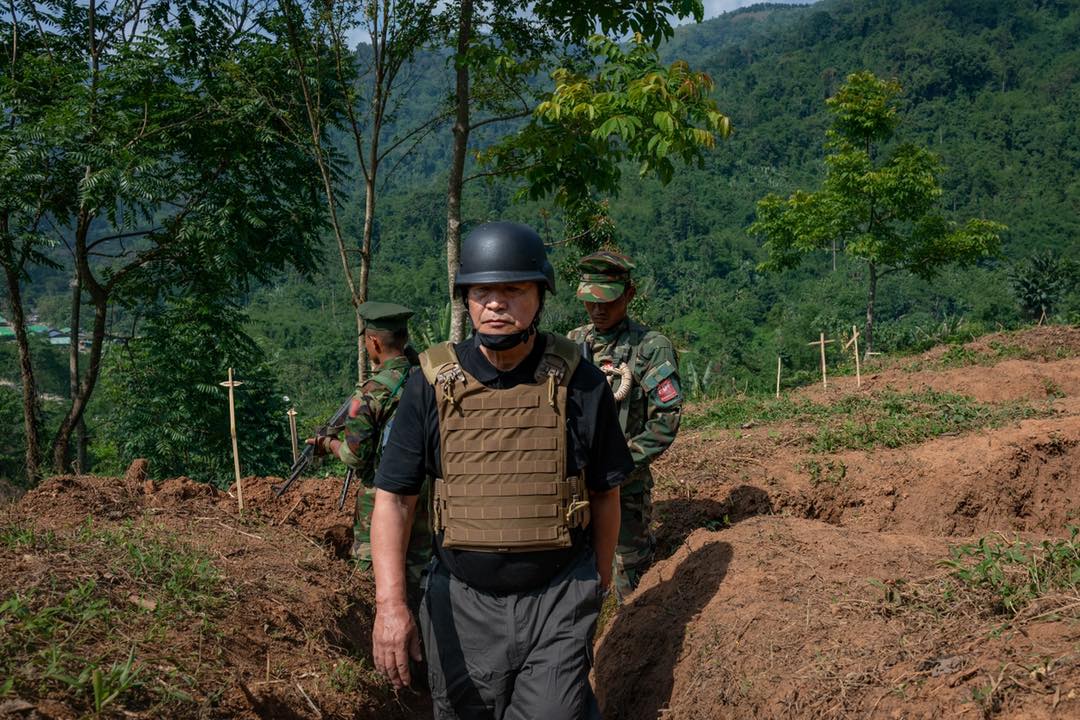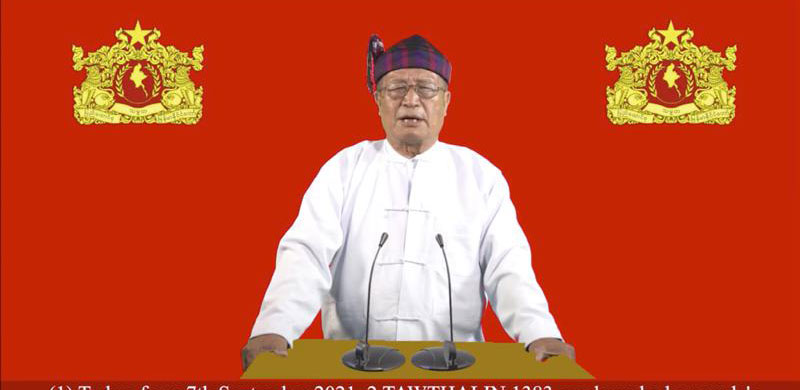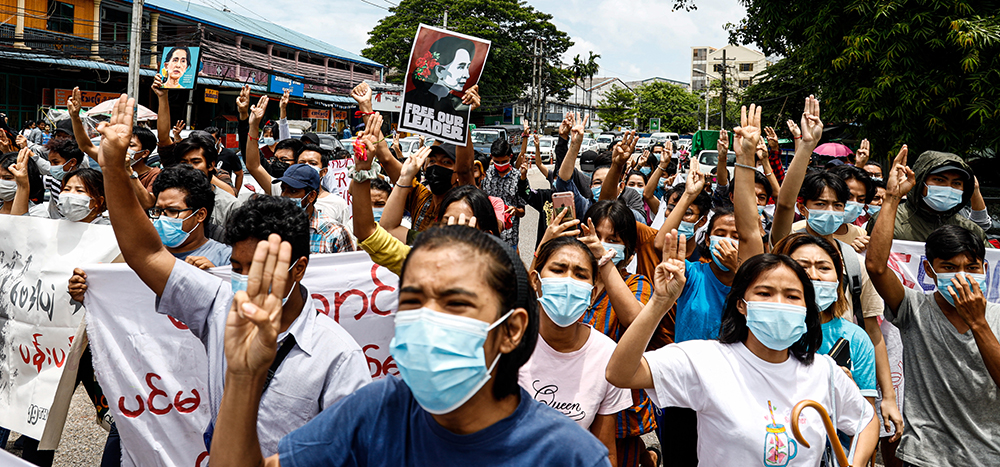In April last year, two months after the Myanmar military seized power in a coup, a group of lawmakers elected in the 2020 general election formed the parallel National Unity Government (NUG).
The following month the NUG formed the People’s Defense Forces (PDF), and later declared a defensive war against the military regime. The PDFs, many of whom received military training from ethnic armed organizations (EAO), are fighting the junta not only in the borderlands, but also across inland Myanmar, which has become the center of the country’s armed revolt against the regime. Since then, the NUG has formed its own parallel administration complete with a judicial system in parts of central Myanmar.
In an exclusive interview with The Irrawaddy, NUG acting president Duwa Lashi La talked about what the civilian government has achieved a year on from its establishment and how the NUG plans to restore democracy and end military dictatorship in Myanmar.
What has the NUG achieved since it was formed?
The military seized power in a coup on February 1 last year to resurrect military dictatorship. People were not happy and staged peaceful protests across the country in both rural and urban areas. And civil servants also joined the Civil Disobedience Movement to show their opposition to military rule. The regime conducted brutal crackdowns on the protesters, and the PDFs were formed on May 5 last year to protect the people. There are over 250 PDF battalions now.
In the aftermath of the coup, the PDFs did not control any areas. But now they control over 15 per cent of the country’s territory. Combined with the territories controlled by the EAOs, revolutionary forces now have control of over half of Myanmar.

On the diplomatic front, the regime has already suffered heavy defeats. It has been shunned by western countries and neighboring countries, as well as by fellow members of the Association of Southeast Asian Nations (ASEAN). The regime was also excluded from the recent ASEAN-US Summit. At the same time, the NUG can now meet government leaders formally and publicly; previously they only met us in private. Although we weren’t able to attend the ASEAN-US Summit, our foreign minister was invited to meet high-ranking officials and US senators. She also had a formal meeting with the Malaysian foreign minister. This is the success of Myanmar people.
Moreover, the NUG has established administrative and judicial mechanisms in areas controlled by PDFs, and we are delivering education, health and humanitarian aid as a government.
You said EAOs and PDFs ontrol over 50 per cent of the country. Where?
PDFs have taken control of rural areas in Sagaing and Magwe regions. So they provide security there. The EAOs already have their own territories. So combined with the territories held by PDFs, we control over half of the country. Junta troops are only present in urban areas, and they are not safe in rural areas.
The military regime refers to the NUG as a virtual government or a government in exile. What is your response?
This is what the military lobbyists will say. In fact, they have already seen that we are not a virtual government. We have carried out many attacks in Yangon. The NUG is a legitimate government that emerged from the support of the people. It is the government formed by the Committee Representing Pyidaungsu Hluttaw (CRPH), which represents the majority of lawmakers elected in the free and fair 2020 general election. It is the government recognized by the National Unity Consultative Council (NUCC), which includes all the political forces such as political parties, EAOs, civil society organizations and strike committees.
The NUG is making balanced efforts at home and abroad for the success of the revolution. Some officials are operating outside the country working for diplomatic recognition. But many ministers, including the chief minister and me, stay inside the country and work together with the people. I mean that most of us are operating inside the country, working together with PDFs and local people’s authorities. We have installed people’s authorities in 36 townships so far. That is testimony to the fact that we are not a virtual government. And nor are we a government in exile. We are the people’s government.
How will the NUG fulfill the demands of ethnic groups for self-determination and racial equality?
Ethnic people want and demand self-determination and racial equality as per promises made in the [1947] Panglong Agreement. The NUG was formed out of the federal democratic charter and we have publicly articulated that we will establish a federal democratic union that guarantees ethnic equality and self-determination.
Regardless of their race, all of those who are taking a lead role in this fight to uproot military dictatorship and restore democracy are trying to build a country that guarantees equality and self-determination.

Some ethnic groups like the Rakhine people are demanding a confederation. What is the NUG’s stance on that ?
The NUG was formed based on the federal democratic charter designed by the NUCC. So the NUG follows that charter as an interim constitution. We will discuss it when we adopt a new constitution after uprooting the military dictatorship. Those topics are to be discussed by the NUCC.
The NUG is assigned by the charter to eliminate military dictatorship and establish a new country that guarantees racial equality, self-determination, liberty and justice. What we can guarantee is equal opportunities for all to establish a genuine federal union. It is important that ethnic groups get the kind of self-determination system they think is suitable for them. We have plans to discuss it in detail during the transition period.
The NUG’s federal affairs ministry said recently that the right of ethnic groups to secede from the union is a radical idea. But that right is formally enshrined in the Panglong Agreement . Does the NUG really think the right to secede is a radical idea?
The NUG cabinet has not discussed it separately. But the federal affairs minister said he failed to check the statement properly before publishing it. But federalism experts say the right to secede is necessary in a federal system because only then will governments try to make themselves good governments in order to prevent secession. We haven’t discussed anything about it so far. I can’t comment because those policies need to be discussed thoroughly by the NUCC and public consultations held on the outcome.
In April, we saw a disagreement between the NUG and EAOs in Kayah State. How do the NUG and EAOs share authority on the ground?
Our home affairs ministry issued an order [to rename an administration committee in Kayah] and the Karenni side filed a complaint. We had a discussion and fixed it. We have to follow the NUCC charter in implementing administrative, legislative and judicial works. We can’t overstep it. The charter says federal states will form legislative, administrative and judicial mechanisms as necessary and the union government and federal units shall consult with the NUCC regarding legislative, administrative and juidical affairs in their states.
I heard the NUG home affairs ministry issued the notice [in Kayah] based on the order on interim administration issued by the CPRH on February 22, 2021, while the NUG’s federal democracy charter was not yet in place. So we held talks with stakeholders from Kayah State and solved the issues.
We have to engage with various ethnic armed groups and there is no room for error. To prevent errors, we constantly engage with EAOs and find solutions through dialogue. I have told ministers to exercise caution.
The coup leader called for face-to-face peace talks with EAOs, but the NUG and PDFs were excluded from his invitation. What is your view on that?
Everyone with common sense can see that such dialogue will not be useful. All the people including politicians are aware of that. The junta leader did it just to see if there is still any opportunity for him to deceive people. The talks will not be successful, as they are intended to deceive people, and he is very aware of that.
To engage in dialogue with the relevant stakeholders is one of the points of ASEAN’s Five-Point Consensus. But the regime leader has excluded us from talks. It is good that he excluded us. We would feel degraded having to talk to him. He has committed so much violence against the people. But he has called us terrorists and says he does not want to meet us. This will do us no harm. It will only harm him, and his reputation will continue to suffer.

If we are pressured by the outside world to hold talks with the regime, we will only meet and not discuss anything serious with them. I have read the outcome of the meeting between the regime and the Restoration Council of Shan State. The Junta leader said he agrees to the establishment of a federal state and will hold frequent talks with EAOs. It is their [the regime’s] strategy to buy time.
What plans does the NUG have to end military dictatorship and establish a federal union in Myanmar?
The NUG is working by various means including militarily, politically and diplomatically to wipe out military dictatorship and establish a federal democratic union. We have formed PDFs which are fighting the regime. At the same time, we are cooperating with EAOs in the military and political arenas. And we have established administrative and judicial mechanisms in our controlled areas. Diplomatically we are trying to foster ties with international organizations, neighboring countries and United Nations agencies.
We are holding political dialogue, which is the basic foundation for establishing a true federal union, with concerned political party leaders, ethnic leaders and civil society organizations. As a result, several countries have downgraded their diplomatic ties with the regime. This shows that they support our actions. Our revolution will succeed because it is a popular revolt.
We also attach great importance to military means. Some people say that dictators release their grip on power only when they die. We are aware that they [the regime] will not give up and admit their faults. So we have to escalate the fighting. But as everyone knows, we are fighting the war with funds from the people. We started with home-made guns, but now we have automatic guns and our revolt is gaining momentum.
As I say, we are engaged in both armed struggle and a non-violent approach. We are trying to win diplomatic recognition, while our PDFs are protecting the people. They have proven this with their actions. But the problem is that no country has given us arms.
It costs large sums of money to arm PDFs. As we have no income from tax revenues, we have to make do with donations from the people. So it takes time. But public morale is very high at the moment and I believe we will get the arms. We are fighting for justice and God will help those who help thmselves. I totally believe things are going to be fine.
You may also like these stories:
Myanmar Junta Expands its Intelligence Operation
Military Junta Administrators Quit After Armed Group’s Death Threats
Cambodia Forced to Put Off ASEAN Meeting as Foreign Ministers Pull Out

















